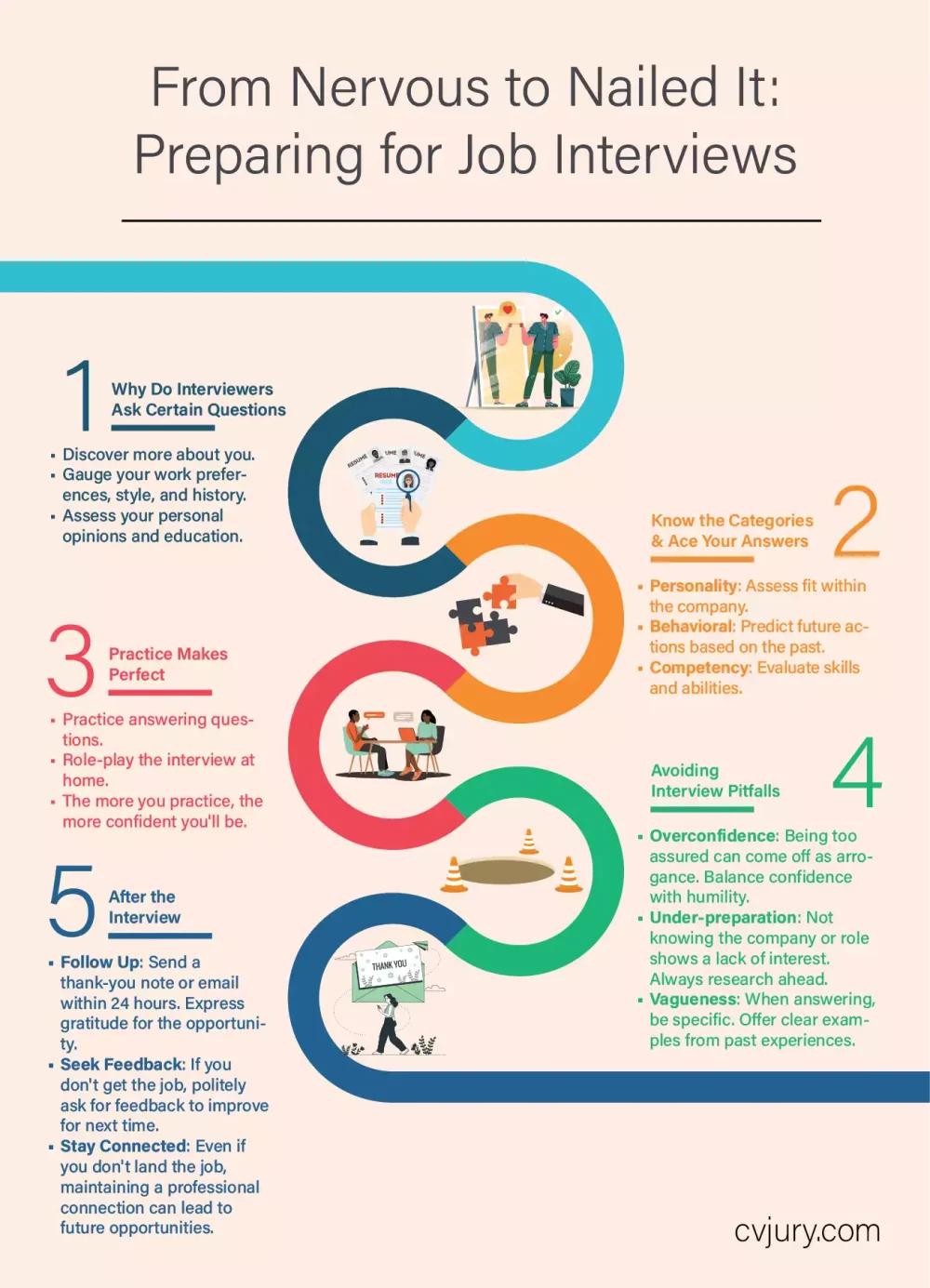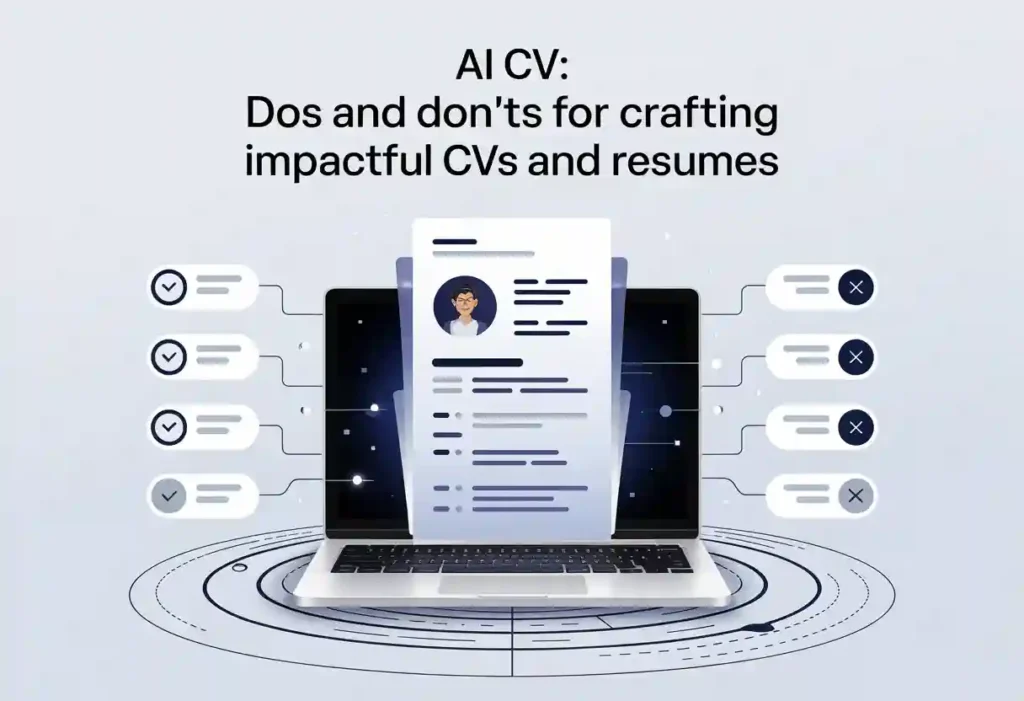From Nervous to Nailed It: How to Answer Interview Questions
Job interviews are nerve-wracking and uncomfortable. You have about an hour to convince a recruiter that you are the ideal candidate for the job.
In this short time, you must demonstrate your soft and hard skills, experience, character traits, leadership qualities, communication skills, and career aspirations.
It is almost too much.
It has not always worked for me. My first few interviews were total shipwrecks.
I would get so nervous that my answers sounded stiff and rehearsed.
Even common interview questions felt like tricks. I thought the recruiter was trying to get rid of me.
It got so bad that I was unemployed for an entire year. I discovered the secret a few agonizing months into my second year without a job.
Before the interview, familiarize yourself with common interview questions. Understanding what the recruiter is asking and why helped me provide more insightful responses.
Practiced answers to common questions helped me relax and do my best during my interviews.
It took a few tries. But I finally gave an excellent interview and landed my current job.
In this article, I will share the secret with you. We will review common types of interview questions, examine why interviewers ask them, and discuss what your answers say about you.
We will then go through sample answers to common job interview questions. Finally, I will give you more pointers to help you ace your job interview like a pro.

Why Do Interviewers Ask Certain Questions?
My experience with interviews was not pleasant, to say the least. I thought the questions were designed to disqualify me.
During your job interview, you can expect to hear a wide range of questions about your work environment preferences, work style, passions, interests, education, last job, and personal opinions.
There are three primary types of interview questions: personality-based, behavioral, and competency-based.
Let’s review these categories one by one. By the end of this section, you will understand why recruiters ask them and how they contribute to the hiring process.
You will also know the best way to answer them.
Top Tip
Asking yourself these job interview questions and practicing their responses will prepare you for the interview.
If you have a willing volunteer, try role-playing the interview at home. The more practice you get, the more confident you’ll be.
For more helpful interview tips and general advice, subscribe to the CVJury Blog or sign up for an account.
Personality-Based Interview Questions
Personality-based interview questions assess your character. They give the recruiter of a new position insight into your general disposition, values, work ethic, style, and interpersonal skills.
Common interview questions about your personality usually ask about your:
- Aspirations: Why do you want the job?
- Behaviors: Can you cope with the job’s demands?
- Competency: Do you have the skills to do the job well?
- Legality: Would you bend the rules?
- Management: How do you work with other people?
- Self-motivation: Are you disciplined and focused?
Essentially, they determine whether you are an excellent and typical cultural fit for the company. These interview questions are often generic and not specific to the job.
Why Do Interviewers Ask Personality-Based Interview Questions?
Recruiters ask these questions to learn more about you beyond your professional achievements.
Your answers can set you apart if you and another applicant have similar experience and skill levels. This is because these questions help the recruiter:
Determine Your Cultural Fit
Your answer to “Do you prefer to work alone or as part of a team?” tells the recruiter if you are independent or collaborative.
Different companies have different management styles, either hierarchical or flat organizational structures. Your answer can reveal if you are a great candidate for the role.
Test Your Soft Skills
The recruiter may ask, “How do you respond to critical feedback?” Your answer will give them insight into your emotional intelligence and communication skills.
“Describe a situation where you had to influence a team member who wasn’t cooperating.” This question tests your negotiation skills and leadership ability.
Assess Your Other Traits
The question “What are your interests or hobbies outside of work?” helps the interviewers to know what other activities you do outside work environ.
How to Answer Common Personality Questions
As a general rule, always listen to the question carefully. Imagine which of your traits the employer is trying to uncover.
Then, narrate relevant anecdotes that display your best soft skills. Consider the following questions and answers.

Tell Me About Yourself and Briefly Describe Your Background
There is a lot you can say about yourself. But keep it concise.
Or, describe how your upbringing and personal experience have prepared you for this new role.
Example Answer
“My younger brother was born with autism. Watching him struggle for years with everyday interactions and communication, I developed a passion for special needs work.
I often volunteered at the local hospital in my town throughout high school and studied Special Needs Education in college to continue serving the special needs community.
My experiences with and compassion for autistic patients will allow me to serve well with you as a social worker, working closely with your doctors.”
How Do You Deal with Stressful Situations or Intense Pressure?
Give an example of an instance where you kept a level head during a crisis.
But be honest. Don’t be afraid to say so if you are still working on better ways to cope with pressure.
Trying to improve yourself is not a negative thing. It shows a commitment to personal growth.
Example Answer
“I have not always been the best at handling pressure. However, after an outburst almost jeopardized an important project two years ago, I adopted healthier coping mechanisms.
I now find that I can keep a level head in stressful situations if I take a step back instead of reacting immediately and ponder the situation. My last boss remarked that she admired my ability to deal with intense pressure.”
Do You Prefer to Work Independently or On a Team?
Research the company. Then, base your answer on what you know about the company culture.
If you are in doubt, a good answer to this question is to say you prefer a combination of both approaches.
Example Answer
“I work very well with little supervision, but I also get along well with my coworkers. I enjoy collaborating with team members and exchanging ideas, a practice that enriches the work process.
However, when called upon to complete a solo project, I am highly disciplined and motivated and can see an assignment through without external input.”
What Type of Work Environment Do You Prefer?
Answer this like the previous question.
Tailor your answer to the culture of the company.
Example Answer
“I enjoy collaborative workplaces where people learn from and improve each other. The constant influx of ideas helps me grow in my role. That said, I previously worked in a positively competitive company and found I was always learning something new.
So I would thrive in an environment that combines collaboration with positive competition.”
Other Common Personality Interview Questions
A few more questions you may encounter include:
- What are your career goals?
- How would the people who know you describe you?
- What are your strengths/weaknesses?
- Describe a challenge you faced and how you dealt with it.
- Have you ever held a leadership position? Describe your leadership style.
- What management style works best for you?
- What is the last book you read?

Behavioral Interview Questions
Behavioral questions reveal your previous reactions and experiences. They prompt you to provide anecdotes of prior job experiences.
These help the hiring manager predict how you might perform in the future. They also tell the recruiter if you have a history of problematic behavior. This may include anger problems, poor decision-making, and antisocial behavior.
Using the STAR Method to Answer Behavioral Questions
Always answer behavioral questions using the STAR method. STAR is an acronym for Situation, Task at Hand, Action, and Result.
Explain what the situation was and what was expected of you. Then, describe the action you took and the results it produced.
We also use the BACAR framework.

Example Behavioral Questions and How to Answer Them
Behavioral questions can sometimes overlap with other categories. They may cover your school, college, previous jobs, or personal life encounters.
Sometimes, the questions may be hypothetical. Let’s review several examples.
Tell Me About a Time You Had a Conflict at Work
Briefly describe the cause of the conflict and your role in it.
Then, mention how you resolved the problematic situation.
Example Answer
“One time in my last role, a sales rep was giving customers outdated prices. The discrepancies caused problems for the business and the head of accounting, who got into a heated altercation with the sales rep.
I called my office’s sales team and lead accountant and asked them to table their reports for the last few weeks. It turned out that a new system we had installed was tallying the prices incorrectly.
The two apologized to each other, and we had the IT department fix the system glitch.”
Describe A Situation Where You Had Tight Deadlines or Budget Constraints
Demonstrate your planning and problem-solving abilities.
Pro Advice:
You do not have to go into detail when discussing previous company projects.
Example Answer
“My team once lost its biggest funder three weeks before a project launch. The situation required that I find a new investor and convince them to back the project without postponing the launch date.
After a meeting with my team, we all volunteered to work overtime for the next few weeks to help push the project along. I then leveraged my professional contacts by sharing my dilemma on my social media handles.
I worked on a proposal that helped us raise money in one week, and we completed the project on time. To say thank you, I gave my team 3 days of paid leave.”
Other Common Behavioral Questions
Other behavioral questions you may encounter include:
- How do you set professional goals?
- Tell me about when you were made responsible for a presentation with little time to prepare.
- Tell me about when you realized you made a wrong business decision.
- Have you ever had a conflict with customers? How did you handle it?
- What is the worst thing a fellow employee did to you? How did you point out their mistake?

Competency-Based Interview Questions
Competency questions form the meat of most interviews.
They are designed to test your hard skills, experience, and proficiency with the tools of your trade.
Why Do Hiring Managers Ask Competency-Based Questions?
The goal of competency-based is to determine if you are qualified for the position.
Interviewers want to know how your education, experience, and skill level can benefit the company.
How to Answer Example Competency Interview Questions from a Hiring Manager
Answer competency-based questions in a way that best demonstrates your skills and experience.
Read the job description to learn what the employer is looking for. Then, consider your qualifications and how they meet these requirements.
Here are some examples:
What Did You Do in The Last Year to Improve Your Knowledge?
Here, the employer tests your knowledge level and ability to adapt to evolving markets. You want to mention several things you have learned through courses or seminars.
If you have not gained any new skills recently, mention any other professional activities you have engaged in outside of work.
Example Answer 1
“I often think about my career goals and what I want to achieve professionally. This last year, I have been working with a mentor on creating strategies and writing a 5-year career plan.
I have not undertaken any formal training, but the feedback and advice from my mentor have given me a deeper understanding of my current role and field.”
Example Answer
“I like to stay ahead in my industry. So, this past year, I have taken a keen interest in the conversation around AI and its impact on cybersecurity.
I have been taking an online course, which I will complete next month, and have attended three national symposiums on the subject.”
How Do You Keep Yourself Organized When Balancing Multiple Projects?
Mention the importance of organization for different tasks.
Be specific. Describe a time when your organizational skills helped you avoid a stressful situation.
Example Answer
“As a project manager, I often juggle several ongoing projects. Using Gantt charts helps me map out the schedules for my active projects to keep track of my resources, teams, events, and primary responsibilities from one place.
A recent analysis revealed that using Gantt charts has improved my efficiency by 65 percent in the last year. The organization method also allows me to manage tight deadline schedules, anticipate unexpected problems, and produce outstanding results.”
Other Common Competency-Based Interview Questions
You may also answer questions like:
- How long have you been at your current job?
- What was the focus of your thesis or dissertation?
- Please provide a complete list of the certifications you hold relevant to this position.
- How did your responsibilities evolve at your last job?
- How would you go about researching [role-specific topic]?
- What was your greatest accomplishment in your last position?
- Have you ever been put in charge of other teams or other departments?

What Are the 7 Main Types of Interview Questions?
Every interview is different. No two recruiters will take the same approach to asking interview questions.
Sometimes, even your position and job requirements inform the types of questions to ask. However, all interview questions can fall into the following seven categories.
Basic Information Questions
Basic interview questions are standard questions employers typically ask to set the stage.
They often summarize your qualities, education, work ethic, work experience, and character traits.
How to Answer Basic Interview Questions
Talk slowly and answer with the first response that comes naturally to you. This session often comes at the beginning of the meeting.
So be yourself and try to form a rapport with the recruiter. The recruiter has interviewed hundreds of candidates, and you need to stand out.
Resume Questions
These are more in-depth questions about your work experience, training, and volunteer work.
They address all the information included in your resume.
How to Answer Resume Questions
Answer these questions according to what is in your resume. Provide relevant examples where possible.
Need help writing a winning resume? Read this CV Jury resume guide.
Career Aspiration Questions
Here, recruiters want to know about your previous roles and future career paths. They are trying to assess if the position is the right job for you.
Essentially, they want to be confident that your application for the job description mentioned is deliberate.
How to Answer Career Aspiration Questions
Be very clear about why you want to pursue this job.
Help the recruiter realize how it aligns with your career and is essential to your future.
Example Career Aspiration Questions
Recruiters will not constantly ask you to describe your career aspirations.
The questions may be more nuanced, such as:
- What do you hope to get out of this position?
- Where do you see yourself in five years?
- What position would you like to hold in the next few years?
Figuring out your career path does not have to be complicated. Check out this comprehensive CV Jury guide on setting career goals.
Abstract Questions
Abstract questions do not always make sense. Their goal is to rattle you, catch you off guard, and test your ability to think on your feet.
The interviewer may ask, for instance, “How many front doors are in New York City?“
How to Answer Abstract Questions
The recruiter does not care about the answer. There is no right or wrong answer.
They want to see your thinking process. This is a test of your problem-solving skills.
Take a breath and think about the question logically. Start with what you know and move toward what you don’t. We will see an example later.
Situational Questions
Situational questions involve hypothetical scenarios. The recruiter wants to see how you react to or deal with specific challenges.
Situational questions test your soft skills, such as communication, leadership, and problem-solving.
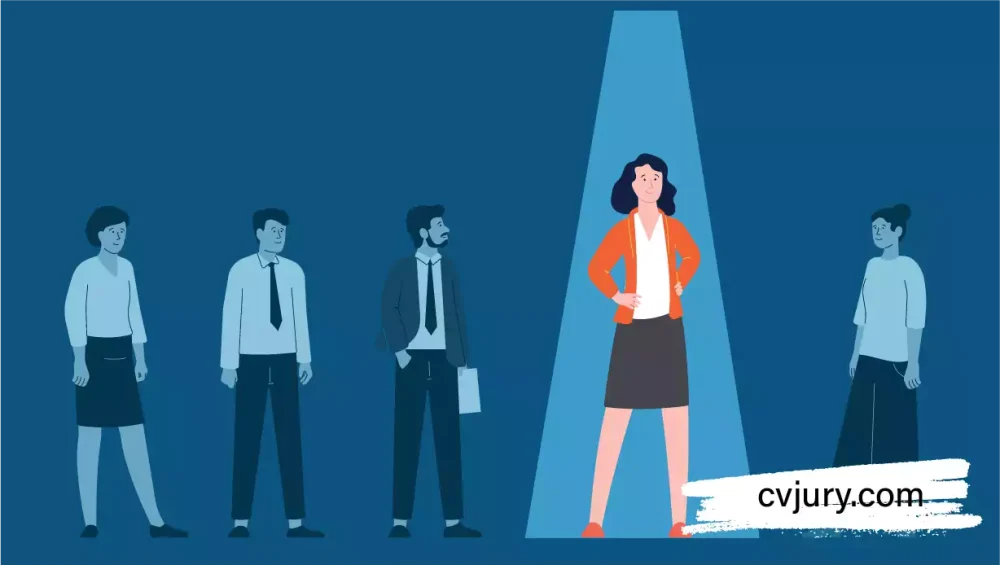
How to Answer Situational Questions
Think of the skills you would use to approach the problem. Then, apply them to your answer.
You can use the STAR approach here, too. Describe the situation the recruiter described and identify your task in the scenario. Next, suggest the action you would take and the results it would produce.
Contribution Questions
These questions allow the recruiter to assess your teamwork capability and help determine your ability to assimilate into the company’s culture.
A classic contribution question example is, “What would you achieve in your first six months within the company if we hired you?”
How to Answer Contribution Questions
Refer to your research on the company description, values, and mission. Match your skills and experience to this information.
However, avoid cliché answers like “I am a team player” or “I am very passionate.”
Weakness Questions
Many employers ask about your strengths. But the most astute hiring managers ask about your weaknesses.
The idea is to test whether you are self-aware enough to assess your ability to meet expectations. Weakness questions also check whether you take the time to evaluate your ability to meet expectations honestly and improve.
How to Answer Weakness Questions
People tend to sugarcoat their shortcomings, which is a red flag. Be candid about your biggest challenges.
But put a positive spin on your answer. Explain the steps you are taking to fix the problem and meet performance expectations.

Preparing for Common Job Interview Questions
In another CVJury post, we talked about answering 16 competency-based interview questions and standard interview questions.
However, in this post, we’ll examine four behavioral interview questions you might encounter in your next interview.
We’ll consider the role of each question, what the recruiter wants to accomplish, and how you could answer.
Question 1: Do You Have Difficulties Getting Along with People?
It’s easy to say that you get along with everybody. But would that be an honest answer?
In truth, most people don’t get along well with everyone. There are certain aspects of who you are that even your closest friends might not like.
The recruiter knows this. They also know that few people will own up to their negative qualities during an interview.
What Is the Purpose of this Question?
This question assesses your understanding of workplace, employee, and client relationships. It evaluates whether you can go above conflicts and pet peeves and be helpful at work.
Also, it tests your ability to stay calm and resolve issues with difficult people.
Possible Answer
“I get along well with people. Relationships with colleagues and clients in my previous positions were primarily positive. I come from a small town where people are friendly and helpful. Of course, you can’t always get along with everyone in an organization.
Adjusting to coworkers and new processes in a new job can be stressful. I’ll try to be mindful of my colleagues’ ideas and personal boundaries. I respect other people’s views, and I don’t think people disagreeing with me is a negative thing.
When I encounter someone difficult, I look at the issue from their perspective. This helps establish a common ground from which we can start building a good relationship. It’s a learning curve, and I hope to improve.”
Question 2: What Kind of Person Are You?
This is such a vague question that a candidate might struggle to answer concisely.
How do you discuss your entire personality in a couple of sentences?
What Is the Purpose of this Question?
This question is mainly trying to establish two things:
- Are you committed to achieving the company’s goals?
- Do you care about your coworkers?
Possible Answer
“People have described me as considerate, focused, and a high achiever. I’m very loyal and have consistently achieved results independently and as part of a team.
Many people I worked with in my previous positions considered me their favorite manager.”
Top Tip
Feel free to go into detail when you answer this question. Talk about real-life examples or a story that supports your claims.
Question 3: How Do You See Yourself in Comparison to Other Candidates?
This interview question is an excellent opportunity to blow your trumpet. Your potential new boss wants to know what makes you different from other candidates.
Your unique skill sets and greatest strengths make you the perfect fit for the team.
What Is the Purpose of this Question?
Do you excel in a particular area? How do you stand out from your colleagues?
At the same time, do you respect your team members?
Possible Answer
I have good reason to be proud of being on the team. I’ve achieved a lot in my last position. I work with many great people daily; it’s highly competitive, which helps keep us excited to push forward. But I’m certainly thrilled to be one of the highest-achieving members of the team.”
Question 4: Who Would Be Your Ideal Manager?
Unfortunately, you don’t get to pick your boss.
Instead, this interview question allows you to suggest what makes a great manager.
What Is the Purpose of this Question?
The recruiter wants to know that you recognize key leadership position traits. Promotions to leadership positions may be on the table.
The worst answer to this question is a canned response. Be original. Explain how you would manage other people and what traits you appreciate in your favorite manager.
Possible Answer
“My ideal manager would communicate well with the team and lead by example. As a team member, I feel motivated when I know the person at the top is also striving towards a common goal. Likewise, most employees like to know their work is appreciated.
So, my ideal manager would set aside time to show appreciation for the team and their ideas. Another important quality in a boss is inspiring their team and encouraging cooperation.
Similarly, they need to be firm, set standards, and be fair and responsible in their approach to management.”
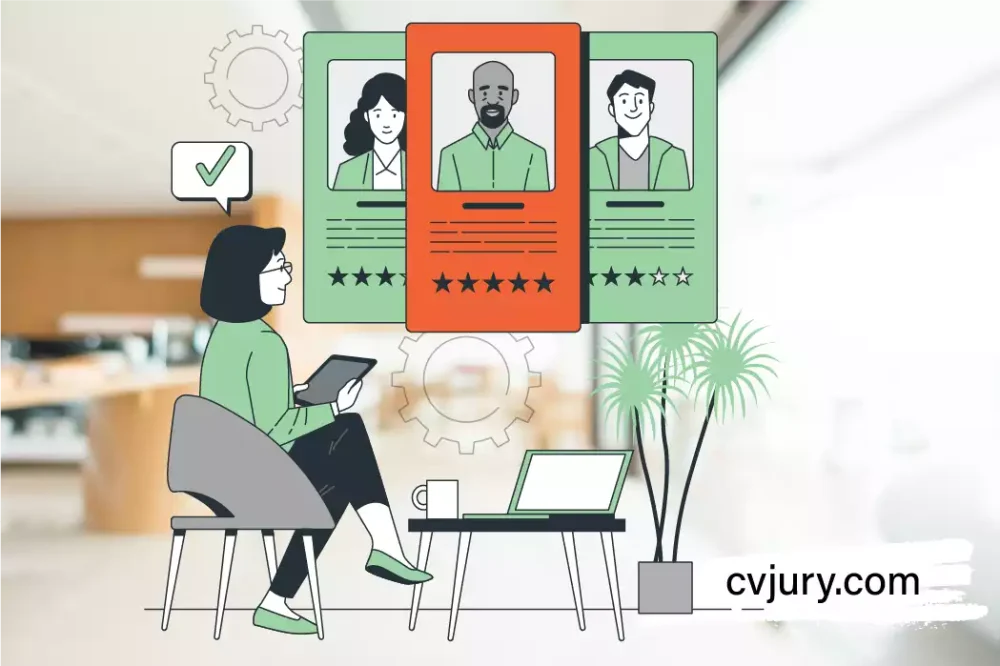
Other Most Common Interview Questions
The truth is that employers want to know as much about you as possible. So you can expect many more questions about your last job and salary expectations.
Let’s look at how to answer other frequently asked interview questions.
Motivation Questions
The hiring manager wants to know what drives you to make professional decisions. Essentially, they ask about your career goals and motivation to pursue them.
They might ask:
What is your interest in this position?
Feel free to sound passionate. Explain what this opportunity means to you.
However, try not to come off as needy. You want the employer to know you are enthusiastic about the job, but not desperate.
You can say:
“I am deeply concerned about the environment and our impact on it. I have always wanted to contribute positively to the world’s environmental conservation. And working at a green energy firm will allow me to leave a positive mark on my surroundings and protect the earth.
Past Employment Questions
Past employment questions can be delicate. Many executives in the same business know each other, so you don’t want to disparage your former boss.
Doing so will make you appear ungrateful and disrespectful. You also do not want to seem like you are comparing the two companies.
Recruiters don’t want to feel like they need to compete for your loyalty. So an ideal answer to the following question would be:
Why did you leave your last position?
“I enjoyed my time at {XYZ} company, and I learned a lot in my {duration} there. However, I grew restless for more growth opportunities, which my previous company did not offer. I am passionate about moving forward and creating better solutions, and I realize I can do that here.”
Employment Gap Questions
Employers want to know about any gaps in your work experience. Some hiring managers understand the need to take time off to care for your family, travel, or return to school.
However, some may be skeptical. The most important thing here is establishing that your time off work was productive.
For instance:
From your resume, it seems you took a gap year. Why was that?
“I took a gap year between my first job and second job after college because I was discontent with my career choice.
I had little experience in the field and was challenged to adjust. I volunteered at a local non-profit business and took evening classes during this time.
My many hours away from the workplace helped put my career path in perspective and launched my current professional track .”
Salary Expectation Questions

Salary expectation questions can be uncomfortable. After all, you don’t want to sound greedy, but you also don’t want to be short-changed.
The best way to answer this question is to base your answer on research. Pay close attention to the salaries of candidates in similar positions and companies.
Focus on your qualifications and experience. Also, consider the company and determine what it pays employees in a similar role.
Then, settle on a range that meets all the criteria, which includes your budget. There is no reason to settle for a salary that cannot cover your rent.
How to Answer Salary Questions
Always discuss the salary in terms of a salary range rather than a specific figure. Also, quote a slightly higher average salary than you want in case the recruiter negotiates you down.
Tip
Never bring up salary expectations until the employer does.
Example Answer
“Taking into account my skills, experience, and the current industry rates, I am considering a salary range of between {amount} and {amount}. This would be fair compensation for my work as your company’s {role}.”
Opinion Questions
You cannot wholly rehearse opinion questions because they rarely have one correct answer. All these questions are designed to determine how you think and how fast you can meet a challenge.
Your boss may also ask these questions to determine your opinions on industry topics.
Common Opinion-Based Questions
Some opinion-based questions you may have already heard include:
- What would you do to improve consumer engagement if you were the head of marketing?
- Is the industry moving in the right direction?
- What innovations and trends will impact the field most in the next five years?
- How would your life change if you won a million-dollar deal today?
- If you could implement two workplace strategies, what would they be?
- What did you think about the last book you read?
- How would you describe how your last boss impacted your career?
How to Answer Opinion Questions
The recruiter is interested in how comfortable you are with your opinions. There is no right or wrong answer.
Think through the question, commit to an answer, and see it through.

Brain Teasers
We mentioned this type of interview question earlier. Brain teasers are abstract interview questions that rarely make sense.
They are common in technical roles where employees must have critical thinking skills. The interviewing manager is usually trying to assess your logical and math skills.
How to Answer Brain Teasers
Let’s look at our previous example. How many front doors are there in New York City?
There is no possible way for candidates to know this. And the recruiter probably does not want to see the answer.
But they want to see that you understand the question and are prepared to find a solution. This tests your creativity and ability to deal with unexpected situations.
You can say, for instance:
“I don’t know for sure. However, I would first find out by using census reports to determine the number of residents in New York City. I could then study residential patterns to determine the average number of people who live in a NYC home. With this information, I…” and so on.
Example Brainteaser Interview Questions
There is no telling what brain teaser question a recruiter will ask you.
But you can expect something like this:
- If I roll two dice, what’s the probability that I miss the six both times?
- What three words would describe a sunset to a blind person?
- How would you determine the pressure an airplane exerts without knowing its weight?
Industry Questions
These are technical questions specific to your field and the hiring company. The recruiter tests your knowledge about how your field and their company work.
These questions are why you should always perform company research before an interview.
Example Questions
Some industry questions a recruiter may ask you include:
- What could we do differently or better as a company?
- How did you hear about this position?
- Who, in your opinion, eventually led to the most substantial progress in this field?
- What is the biggest issue companies in our field face today?
- What department or existing team of the XYZ company should receive the most funding?
How to Respond
Be honest and objective. But try to put a positive spin on every response. Compliment the company and its policies.
Offer realistic and well-thought-out solutions and feedback on the challenges in your field. But don’t be overly critical of the company interviewing you.
It is also essential that you don’t go overboard and turn your feedback into a lecture.

Questions for the Interviewer
Many employers will give you a chance to engage with them. Don’t mistake this as unimportant. The recruiter is still testing your qualities.
They want to see if you are focused, naturally curious, and have an excellent grasp of their company or industry’s concerns.
What Questions Should You Ask the Interviewer During the Hiring Process?
You can ask the recruiter any follow-up questions that come to mind. The questions should be appropriate and relevant to the interview.
It could be about the tasks you would handle in the next few months, the company’s policies, or the position. If the interviewer has already covered these topics, think outside the box.
Ask tailored but professional questions, such as:
- How long have you been working here?
- What is it like in this role?
- What’s your favorite memory of working here?
- What can you tell me about your latest projects?
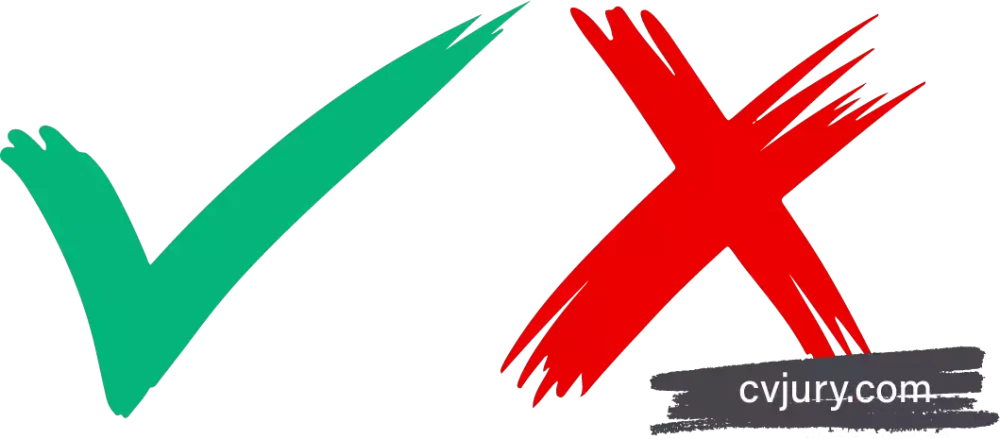
Illegal and Legal Interview Questions: What Can an Interviewer Not Ask You?
Some interview questions are inappropriate or even illegal. As with other interview questions, your response to these questions can make or break the interview process.
So, how do you respond when an interviewer asks you an inappropriate question?
Example Illegal Questions
First, you should know what constitutes an illegal or inappropriate interview question. Some questions employers are not allowed to ask you include:
Questions About Your Age
It is good practice for a recruiter to want to know if a new hire is old enough to work in a role.
This question is important because labor laws prevent minors from working for a certain number of hours or under specific conditions.
After you get the job, your manager is expected to request your ID or birth certificate. This information helps them fill out insurance forms.
However, at no point during an interview should a recruiter ask you:
- How old are you?
- When were you born?
- How old were you when you graduated from high school?
Questions About Your National Origin
Your interviewer will want to know if you are a legal US resident or if you have a valid work visa. They may also ask about the languages you speak, write, and read fluently.
However, it would be inappropriate to forward a question to candidates like:
- Where were you born?
- What is your nationality?
- What is your heritage?
- Where do your parents come from?
- What language do you speak at home?
- How did you learn to speak, read, or write a foreign language?
Questions About Your Citizenship
It is appropriate for a recruiter to ask candidates if they have obtained legal citizenship status.
If you are not a citizen, you must have a valid work visa. Recruiters may also ask for proof of employment eligibility once they hire candidates.
But, they cannot ask:
Are you a citizen?
Is your spouse a citizen?
Are your parents citizens?
When did you/ your spouse/ your parents acquire citizenship?
Are you a native-born or naturalized citizen?
Questions About Your Marital Status
When filling out insurance and tax forms, your hiring manager may ask about your marital status. This is appropriate after they hire you.
However, marital status questions are not appropriate interview material. An interviewer may not ask a candidate, for instance:
- Do you live with your parents or with a spouse?
- Are you single, engaged, married, separated, divorced, or widowed?
- What is the name of your spouse?
- Is that your married or maiden name?
- What will your spouse say if you decide to stay late at work?
Questions About Your Parental Status
Understandably, recruiters want to understand your availability to perform your tasks. They may ask if you can work overtime or on weekends.
They may also ask if there is any reason you can’t come in early, attend weekend meetings, etc.
But, they may not ask a candidate:
Are you pregnant?
Do you have children?
Do you plan to have children?
How many children do you have?
Have you organized childcare for your children?
Questions About Your Race or Skin Color
Discussing race or skin color in an interview is inappropriate. Recruiters may not ask an employee or candidate:
- What race are you?
- Do you belong to a minority group?
Questions About Your Religion or Creed
An interviewer can ask if you can work during weekends.
You are not obligated to discuss your religion.
You can say that weekends are not a good time to work.
It would be inappropriate for the interviewer to ask a candidate:
- Do you attend church regularly?
- Do you go to the mosque?
- What is your religious affiliation?
- Which religious holidays will you be taking off from work?
Questions About Your Residence
Your interviewer may ask for your mailing address. This is appropriate because they want to contact you.
They can also ask if you can get to work by a specific time. Then, it is up to you to mention whether you live nearby.
However, the interviewer cannot ask job interview questions like:
- Do you live in town?
- Do you own or rent your home?
- With whom do you live?
Questions About Disability
The recruiter may ask if you can comfortably perform your job responsibilities. They can also request your medical history to help them file insurance forms after you get the job.
But they cannot ask:
- Do you have a medical condition?
- Do you have any disabilities?
- How does your condition affect your abilities?
Questions About Your Criminal Record
Interviewers can ask if you have ever been convicted of a crime.
But they cannot ask:
- Have you ever spent a night in jail?
- Have you ever been arrested?
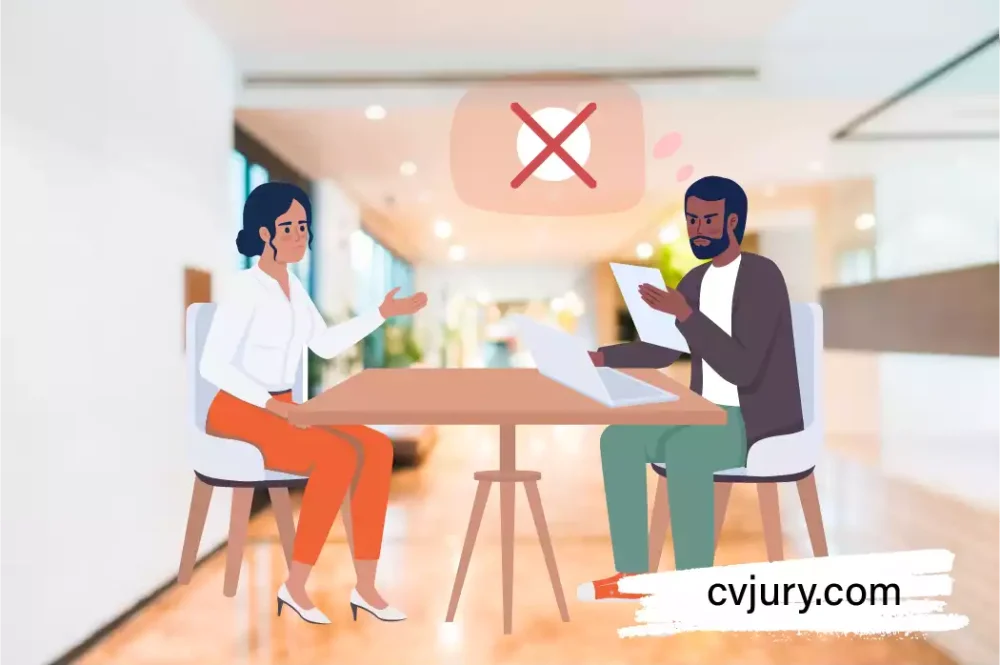
How to Respond to Inappropriate Interview Questions
Most interviewers know they must avoid these questions. But some may still ask them.
Your options in this situation include ignoring the question, politely changing the topic, or responding.
Ignoring the question may portray you as arrogant and rude, while answering it can sometimes jeopardize your chances of getting hired.
So, your best bet is to change the topic politely. Gracefully dodge the question and redirect the conversation.
Also, keep your answers general and short. For instance, the interviewer may ask if you are a naturalized citizen.
You can answer this question by asserting that you can work in the country. Diplomatic answers like these are often enough to give the recruiter a hint to drop the topic.
If they push, you can ask them why the question is relevant to your job. However, try to avoid immediately jumping on the defensive.
Don’t say things like, “That is illegal to ask,” or “I don’t want to talk about that.”
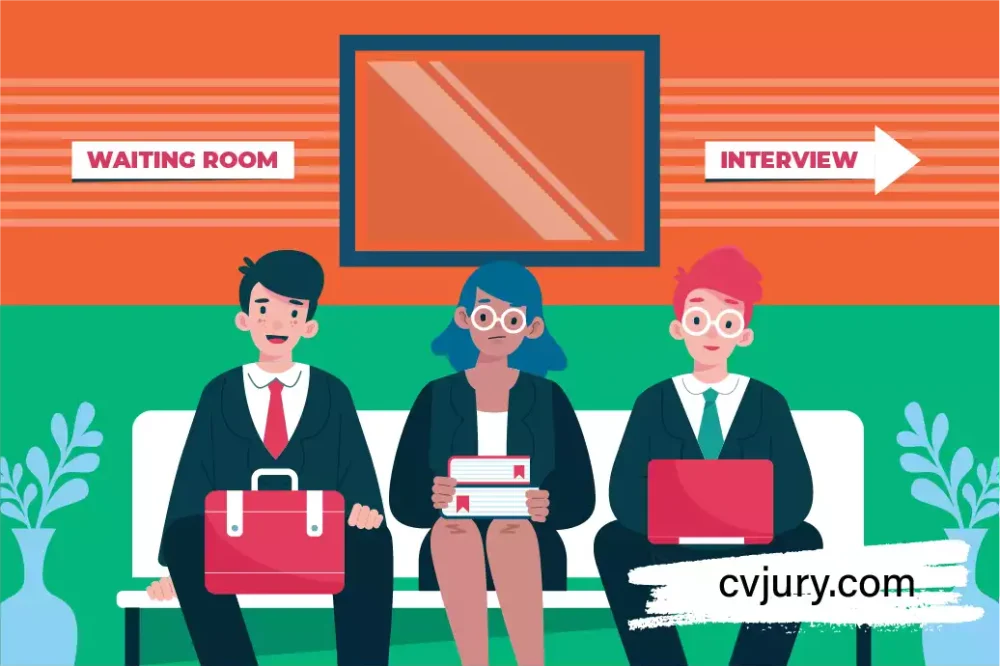
Tips on How to Go About Job Interview Preparation
Always prepare for an interview. The more prepared you are during an interview, the more relaxed you can be.
The idea is to know you can answer any recruiter’s question.
You don’t have to memorize all the answers. But knowing you can understand the recruiter’s intent and meet it will give you an edge.
You should:
Connect Your Answers to the Job Description
Read the job description carefully and glean the keywords. What skills and capabilities does the recruiter want for this role?
Find a way to relate all your answers to these skills. For example, the recruiter may want someone with good communication skills.
They also asked you about a conflict you had at work. Give an answer that demonstrates your ability to communicate effectively.
Explore Your Network for Insider Information
Before entering the interview room, find out who your interviewer is. Leverage your research skills to learn about the hiring company and its culture.
Find out the type of management prominent at the company, the level of formality, and more. You can also consult people in your network.
Preferably someone who has worked or dealt with the company before. Then, make sure your answers align with the company culture.
Show, Don’t Tell
Finally, consistently demonstrate your skills and abilities. Don’t describe them.
Don’t just tell the recruiter you are a good leader. Give a story that “shows” you are a good leader.
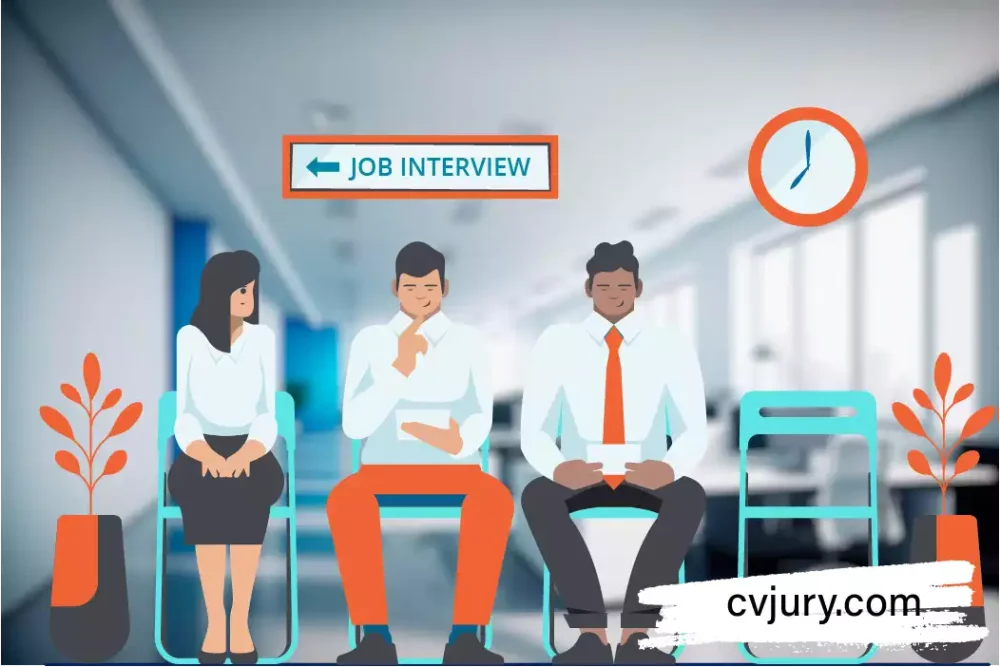
Best Practices for Answering Interview Questions
Your goal is to provide meaningful responses with relevant detail and context. Avoid one-word answers. Prepare illuminating examples from past experiences.
However, be authentic, don’t overrehearse. Ask for clarification if you don’t understand a question.
Finally, ensure your responses highlight the abilities, skills, and character traits required for success in your role.
Go into Detail
Avoid one-word answers. Provide context and explain your thought process
Be Honest
Be honest and objective. But put a positive spin on answers when possible.
Illustrate with Examples
Have anecdotes from past experiences ready for reference. These will lend credibility to your answers.
Speak Naturally
Practice common interview questions and answers. But don’t memorize answers because you may sound too rehearsed
Ask Clarification Questions
You don’t have to give a response to a question immediately, especially if you have not heard or understood the recruiter.
You might rush and miss the point of the question. Ask clarifying questions if you need a prompt that is better explained.
Dos and Don’ts for Answering Interview Questions
Consider the following dos and don’ts when answering interview questions.
Dos
- Practice responding to common interview questions at home and ask friends to interview you. More practice equals better performance.
- Research, research, research. Learn what you can about the job position, company, and office culture to know what the employer is looking for.
- Prepare a list of the best interview questions to ask the interviewer. These can be about the company, job position, or role in the company.
- Highlight the skills and traits that make you stand out and a good fit.
- Take a personality quiz. If self-awareness isn't your strength, a personality quiz provides many answers to common interview questions.
- Rate your performance. After every interview, note what you did well and what you could have improved. Then, use your self-assessment to ensure you are a good fit for the next interview.
- Be honest. Don't pretend to be someone you’re not in an interview.
Don'ts
- Don’t be vague. Personality questions are specific, and the interviewer seeks a particular answer. Avoid generic responses. Give specific examples where possible.
- Don’t memorize an example. Personality questions should have a personal response. Although you can use the examples above for inspiration, formulate your answer.
- Don’t be arrogant. Sometimes, overconfidence is worse than underconfidence. Try to find the balance. Be respectful and humble.
- Don’t beat yourself up. No matter how well you are prepared, not every interview will be successful, and you will not always be the right fit for a company. Remember that rejection is a standard step to success, and focus on your next steps.
- Don’t lie or exaggerate your qualifications. Don’t speak negatively about past employers or colleagues.
- Don’t interrupt the interviewer.
- Don’t ramble; keep answers concise and sharp.
Like this post?
Sign up for our blog updates and never miss a post.
We’ll send you A FREE job interview eBook as a thank-you.
FAQs
The following are sample interview questions and answers. You don’t need to memorize the answers word for word.
However, studying them can help you craft your responses.
What is a possible answer to “How did you hear about this position?”
“I follow your company on LinkedIn and read your daily posts. Two weeks ago, I read an update you posted about how you were reshuffling your game design department and were considering bringing younger developers on board.
So, I put a notification on all your job ads, and this job ad popped up about three days later. I have been a big fan of your work for many years and was excited to apply.”
What is a possible answer to “Why did you decide to apply for this position?”
“I keep track of all your Green Energy products. I have done freelance designs for your online outfit over the years, so I was very excited to hear about a permanent position in your Graphics Design department.
After reading the job description, I was convinced I would be the right fit for your company, as I am familiar with your brand identity and voice.”
What is a possible answer to “What’s a time you disagreed with a decision made at work?”
“One time at my previous job, we had to prepare a presentation to attract a prospective client. My supervisor wanted to play it safe and use typical print and PowerPoint presentations.
However, my research on the client revealed that he was very spontaneous and enjoyed creativity in the workplace.
I was convinced we needed to do something unusual to impress the investor. However, my supervisor thought it was too risky and stalled my idea for two weeks.
Having worked on it for a while, I convinced my supervisor to let me package the presentation as a “welcome to the company” bit and develop a second, more traditional presentation.
The investor liked my first presentation so much that he gave us the go-ahead before we presented the second one. I was proud that I stood up for my idea without antagonizing my supervisor.”
What is a possible answer to “How do you feel about working weekends or late hours?”
“I am okay with working late if you give me sufficient notice. Letting me know early that you need me to stay late will help me better realign my schedule. That said, I would appreciate some time off during the weekend to recharge and perform at my best the following week.”
What is a possible answer to “Why are you leaving your current job?”
“I have been working at my last company for three years. While I appreciate all the opportunities the company has provided me, I am ready to take the next step in my career. Your global reach will help me stretch my capabilities, reach larger markets, and grow in my field.”
What is a possible answer to “How would your past coworkers describe your interactions with them? Why would they describe them this way?”
“I often take on leadership roles in my current company. So, my coworkers would describe me as tenacious, dedicated, time-conscious, and proactive. They may also call me bossy because I push them to get results, but it is all good-natured.
We perform better when we stick to budgets and deadlines, and I always ensure my team delivers a project on time. Most recently, my last boss described my job performance as ‘highly efficient and productive.'”
What is a possible answer to “Why should we hire you?”
“I respect a lot of what you do here at XYZ Company. The fact that you have consistently topped the Forbes list of the most influential IT companies in the world is a testament to your good instincts and sound policies.
However, I am also keenly aware of how fast the industry changes and understand the need to keep up. As a dynamic software developer fresh in the job market, I am very conversant with emerging tech trends and their impact on the industry.
I regularly take online courses to keep up with changing industry standards and am very fast on my feet. This makes me an invaluable asset to your company, even as we move toward technologies like the Metaverse.
My unique perspective, extensive background knowledge, work history, and adaptability make me a good fit for you. I can help you stay ahead of the current and maintain your esteemed status.”
What is a possible answer to “What’s your management style?”
“If I were managing a team, I would be more of an oversight presence over the people working under me. People work better when you give them clear instructions and allow them room to do the work as they feel is best.
This does not mean that I would leave everything to my team. However, I would be very open to suggestions and corrections because we achieve the best results when we feed off each other’s strengths.
In addition, I would be as hands-on as possible when working with young or new employees. Setting a good example for them in the beginning will give them more confidence in the future when I direct them on a solo project.
What is a possible answer to “What are you passionate about outside of work?”
During my free time, I like to organize community outreaches to local schools and communities to talk to young girls about a career in the sciences.
I am very passionate about women in STEM, and organizing these talks is an extension of my natural organizational and leadership skills. Over the years, I have gotten some partners on board, who have helped me reach more girls in more schools.”
Key Points
You are ready to ace your next job interview with all this information.
Here are some key things you should remember:
- Interviewers ask different questions to assess your personality, past behavior, and capability.
- Some interview questions are generic, but most are specific to your role or industry.
- Reviewing commonly asked interview questions can help you understand the interviewer’s mind.
- Answering mock questions can help you get familiar with interviews so you can perform well.
- There are rarely any right or wrong answers.
- The interviewer wants to see how you think on your feet, how you evaluate your talents, etc.
- Whatever the question, stay calm, breathe, and work through it.
- Always connect your answers to the job description and company culture.

Preparation Is the Secret Ingredient to a Successful Interview
Imagine you have a test. You don’t know anything about the test or who will offer it. You only know the general topic. How can you pass such a test? Easy.
Start by researching the person testing you. Who are they? What do they value most? How do they communicate?
This is the company interviewing you. Next, review questions commonly asked in similar tests. How have other people answered these questions in the past?
These are the sample answers we have provided in this article. You’re almost ready now, but you need one more secret ingredient.
Consider your character and background. What are your skills and talents? What is your passion? Craft customized answers for generic questions. You may not need all your answers for the test.
But your preparedness will help you navigate any unexpected twists. What are we trying to say? Simple.
The best way to ace your interview is to prepare. Find out all you can about the hiring company, and read the job description until you memorize it.
Practice answering common interview questions. Brush up on new developments in your field. Then stay calm, breathe, be yourself, and ace that interview like a pro.
Best of luck!
Want to land more callbacks and your desired job? Read our article on how to write a resume like a guru.
Have you been asked any of these behavioral interview questions recently? Please get in touch or leave your comment below. We’d love to hear your views.

